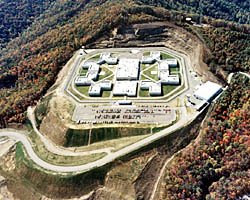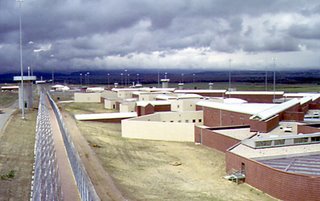SUPERMAXED: An Introduction
Supermaxed, the website, started about five years ago. I became interested in the institution of super maximum security prisons when corrections officials of the state I live in sent a planeload of more than 100 mostly medium and minimum security prisoners to what was then one of the most oppressive supermax prisons in the country: Wallens Ridge State Prison in Big Stone Gap, Virginia. That happened in 1999.
 The recipients of the all-expenses-paid trip to Virginia had the misfortune to have been in a privately run prison when a guard was killed. Even though those prisoners had nothing to do with the murder, the Secretary of Corrections thought they needed to be taught a lesson, so he shipped the hapless prisoners to Virginia to live in a supermax prison for a while.
The recipients of the all-expenses-paid trip to Virginia had the misfortune to have been in a privately run prison when a guard was killed. Even though those prisoners had nothing to do with the murder, the Secretary of Corrections thought they needed to be taught a lesson, so he shipped the hapless prisoners to Virginia to live in a supermax prison for a while.
I knew such places existed; but I assumed that only "the worst of the worst," as they said, were sent there. I quickly learned that was far from the truth; that these were, indeed, cruel places. And that they weren't always filled with "the worst."
I tried to learn all I could about supermax prisons. The result was "supermaxed.com," a website dedicated to information, references, and resources about supermax prisons in the U.S. Eventually, I included material about other prisons, and the abuse and torture of prisoners here and around the world.
 On May 4, 2006, a federal judge sentenced would-be terrorist Zacarias Moussaoui to multiple sentences in supermax prison. About a week later, federal authorities flew him from Virginia to the federal supermax penitentiary in Florence, Colorado. He is supposed to spend the rest of his life there.
On May 4, 2006, a federal judge sentenced would-be terrorist Zacarias Moussaoui to multiple sentences in supermax prison. About a week later, federal authorities flew him from Virginia to the federal supermax penitentiary in Florence, Colorado. He is supposed to spend the rest of his life there.
The international debate over Moussaoui's sentence centered on whether life in solitary confinement is "better" than the death penalty. The meaning of "better" ranged from "more humane" to "more cruel." The most insightful commentary I found was in the May 15, 2006, issue of the New Yorker magazine: Sentenced, a comment by Hendrick Hertzberg.
According to all reports, Moussaoui was hopelessly inept. He literally never got off the ground. His flight simulator instructor tipped off the F.B.I., and he spent September 11, 2001, in jail. He pled "guilty" and the U.S. prosecutors wasted a year attempting to get the death penalty. But the jury spared his life and sentenced him to life imprisonment instead. The jury foreperson described the frustration she felt as a lone holdout juror repeatedly cast the ultimately prevailing vote against death.
One commentator, Charles Krauthammer, discussed the reasons he would have chosen life imprisonment over the death penalty:
So Moussaoui is in his supermax prison cell, alone with himself and nothing to do for the rest of his life. Which is "better" for Moussaoui, life in a supermax prison cell or death? One of the many interesting discussions of the death-or-life choice is here.
 The recipients of the all-expenses-paid trip to Virginia had the misfortune to have been in a privately run prison when a guard was killed. Even though those prisoners had nothing to do with the murder, the Secretary of Corrections thought they needed to be taught a lesson, so he shipped the hapless prisoners to Virginia to live in a supermax prison for a while.
The recipients of the all-expenses-paid trip to Virginia had the misfortune to have been in a privately run prison when a guard was killed. Even though those prisoners had nothing to do with the murder, the Secretary of Corrections thought they needed to be taught a lesson, so he shipped the hapless prisoners to Virginia to live in a supermax prison for a while.I knew such places existed; but I assumed that only "the worst of the worst," as they said, were sent there. I quickly learned that was far from the truth; that these were, indeed, cruel places. And that they weren't always filled with "the worst."
I tried to learn all I could about supermax prisons. The result was "supermaxed.com," a website dedicated to information, references, and resources about supermax prisons in the U.S. Eventually, I included material about other prisons, and the abuse and torture of prisoners here and around the world.
 On May 4, 2006, a federal judge sentenced would-be terrorist Zacarias Moussaoui to multiple sentences in supermax prison. About a week later, federal authorities flew him from Virginia to the federal supermax penitentiary in Florence, Colorado. He is supposed to spend the rest of his life there.
On May 4, 2006, a federal judge sentenced would-be terrorist Zacarias Moussaoui to multiple sentences in supermax prison. About a week later, federal authorities flew him from Virginia to the federal supermax penitentiary in Florence, Colorado. He is supposed to spend the rest of his life there.The international debate over Moussaoui's sentence centered on whether life in solitary confinement is "better" than the death penalty. The meaning of "better" ranged from "more humane" to "more cruel." The most insightful commentary I found was in the May 15, 2006, issue of the New Yorker magazine: Sentenced, a comment by Hendrick Hertzberg.
According to all reports, Moussaoui was hopelessly inept. He literally never got off the ground. His flight simulator instructor tipped off the F.B.I., and he spent September 11, 2001, in jail. He pled "guilty" and the U.S. prosecutors wasted a year attempting to get the death penalty. But the jury spared his life and sentenced him to life imprisonment instead. The jury foreperson described the frustration she felt as a lone holdout juror repeatedly cast the ultimately prevailing vote against death.
One commentator, Charles Krauthammer, discussed the reasons he would have chosen life imprisonment over the death penalty:
In the Moussaoui case, there were three plausible grounds for mitigation: insignificance, lunacy or deprivation. Insignificance would have been my choice. Moussaoui was hardly even a cog. If he had any role in Sept. 11, which is doubtful, it was very peripheral. He was a foot soldier in an army of evil, but he never got a chance to practice his craft. That warrants life, not hanging.At the sentencing the Judge told the terrorist:
Mr. Moussaoui, when this proceeding is over, everyone else in this room will leave to see the sun...hear the birds...and they can associate with whomever they want. You will spend the rest of your life in a supermax prison. It's absolutely clear who won.About a week later, Osama Bin Laden announced that Moussaoui really had nothing to do with the September 11 terrorist attacks. Believe it or not, "innocent" or "guilty," Moussaoui is in supermax prison for the rest of his life.
So Moussaoui is in his supermax prison cell, alone with himself and nothing to do for the rest of his life. Which is "better" for Moussaoui, life in a supermax prison cell or death? One of the many interesting discussions of the death-or-life choice is here.
